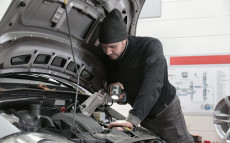- pathfindersAI
- Job Profile
Outdoor Power Equipment and Other Small Engine Mechanics
Summary
Outdoor Power Equipment and Other Small Engine Mechanics: A Career Overview
Pursuing a career as an Outdoor Power Equipment and Other Small Engine Mechanic offers a path filled with hands-on work and a distinct sense of accomplishment. In this essay, we will explore the multifaceted dimensions of this profession, examining facets such as job responsibilities, essential skills, educational pathways, career prospects, and more.
What They Do
Outdoor Power Equipment and Other Small Engine Mechanics are specialists who focus on the maintenance and repair of various small engines and power equipment. These include lawnmowers, chainsaws, recreational vehicles, and other machinery used for outdoor activities and landscaping. Their expertise ensures that outdoor power equipment operates efficiently, providing safety and reliability to users. The work typically involves troubleshooting engine problems, disassembling engines to replace defective parts, and reassembling the equipment to restore functionality.
Job Responsibilities
The responsibilities of Outdoor Power Equipment and Other Small Engine Mechanics are diverse and cover a wide range of tasks. They perform routine maintenance, such as oil changes, spark plug replacements, and air filter cleaning. When issues arise, mechanics diagnose mechanical or electrical problems using specialized diagnostic tools. They may remove and replace parts that are worn out or damaged, such as carburetors, pistons, and belts. Additionally, mechanics must often keep records of the repairs performed, maintain inventories of parts, and handle customer service interactions, providing explanations of repairs and maintenance advice.
Essential Skills
Success in this field requires a mix of technical and interpersonal skills. Mechanics need a solid understanding of engine mechanics, including the principles of internal combustion and the functioning of various parts. Proficiency with tools and diagnostic equipment is a must, as is the ability to read and interpret technical manuals and schematics. Strong problem-solving skills are crucial for diagnosing and fixing engine issues efficiently. Attention to detail is vital for ensuring that all components are properly installed and functioning correctly. On the interpersonal side, effective communication skills help in explaining repair needs and procedures to customers and colleagues.
Educational Pathways
Educational pathways to becoming an Outdoor Power Equipment and Other Small Engine Mechanic vary, but most require at least a high school diploma or equivalent. Many mechanics enter the field through vocational training programs or community college courses that offer specialized training in small engine repair. These programs often combine classroom instruction with hands-on training, encompassing subjects like engine diagnostics, fuel systems, and electrical systems. Some mechanics may choose to obtain certifications through organizations like the Equipment & Engine Training Council (EETC), which can enhance job prospects and demonstrate a commitment to the profession.
Career Prospects
The career prospects for Outdoor Power Equipment and Other Small Engine Mechanics are generally favorable. According to data from the U.S. Bureau of Labor Statistics, the employment of small engine mechanics is expected to grow as there continues to be a demand for outdoor power equipment. Mechanics may find opportunities in various settings, including repair shops, equipment dealerships, rental centers, and even self-employment. The skills acquired in this profession can also be transferable to related fields, providing flexibility for career advancement or transition.
Conclusion
In conclusion, the role of an Outdoor Power Equipment and Other Small Engine Mechanic encompasses a broad spectrum of responsibilities and skills. It is a fulfilling career for those who enjoy working with their hands, solving technical problems, and ensuring the reliability of essential equipment. With the proper educational background and a dedication to honing their craft, individuals in this field can look forward to stable employment opportunities and the satisfaction of contributing to the efficient operation of outdoor power tools and machinery. This career not only promises steady demand but also offers the chance to continually develop and apply a valuable set of mechanical skills.
Video
Compensation
| State | Median Salary | Median Hourly | Positions |
|---|---|---|---|
| AL | 37,810 | 18.18 | 540 |
| AK | 50,630 | 24.34 | 50 |
| AZ | 45,470 | 21.86 | 450 |
| AR | 37,400 | 17.98 | 360 |
| CA | 46,280 | 22.25 | 3,150 |
| CO | 47,540 | 22.86 | 410 |
| CT | 48,200 | 23.18 | 680 |
| DE | 43,890 | 21.10 | 130 |
| FL | 41,320 | 19.86 | 3,970 |
| GA | 41,400 | 19.91 | 830 |
| HI | 49,330 | 23.72 | 270 |
| ID | 39,970 | 19.22 | 410 |
| IL | 44,400 | 21.35 | 490 |
| IN | 44,250 | 21.27 | 910 |
| IA | 38,620 | 18.57 | 430 |
| KS | 42,300 | 20.34 | 330 |
| KY | 37,440 | 18.00 | 720 |
| LA | 40,610 | 19.53 | 230 |
| ME | 45,370 | 21.81 | 320 |
| MD | 42,170 | 20.27 | 300 |
| MA | 55,430 | 26.65 | 410 |
| MI | 44,830 | 21.55 | 1,580 |
| MN | 47,470 | 22.82 | 760 |
| MS | 34,530 | 16.60 | 230 |
| MO | 42,350 | 20.36 | 1,110 |
| MT | 44,180 | 21.24 | 160 |
| NE | 39,680 | 19.08 | 420 |
| NV | 46,800 | 22.50 | 250 |
| NH | 48,910 | 23.52 | 210 |
| NJ | 48,380 | 23.26 | 670 |
| NM | 41,400 | 19.90 | 130 |
| NY | 46,400 | 22.31 | 1,480 |
| NC | 42,440 | 20.41 | 1,840 |
| ND | 49,990 | 24.04 | 90 |
| OH | 43,650 | 20.99 | 1,300 |
| OK | 43,330 | 20.83 | 400 |
| OR | 46,870 | 22.54 | 550 |
| PA | 42,950 | 20.65 | 1,670 |
| RI | 49,810 | 23.95 | 110 |
| SC | 39,340 | 18.91 | 580 |
| SD | 38,000 | 18.27 | 210 |
| TN | 36,950 | 17.77 | 780 |
| TX | 43,460 | 20.89 | 1,990 |
| UT | 36,220 | 17.41 | 510 |
| VT | 36,000 | 17.31 | 120 |
| VA | 43,710 | 21.02 | 1,340 |
| WA | 48,180 | 23.16 | 880 |
| WV | 36,060 | 17.34 | 250 |
| WI | 47,440 | 22.81 | 980 |
| WY | 52,520 | 25.25 | 80 |
Similar Occupations
In this area you will find other occupations that are close to the one you were viewing in tasks, knowledge and work environment. If the primary job profile you are viewing isn't quite to your liking, take a look around and see what else is available.
Basic and Premium Accounts have more alternative occupations available than the Free account.

Automotive Service Technicians and Mechanics - 49-3023.00
Automotive Service Technicians and Mechanics diagnose, maintain, and repair vehicles by inspecting and working on various components such as engines, brakes, transmissions, and electronics. They ensure automobiles are safe and efficient by conducting routine maintenance, performing complex repairs, and using specialized tools and diagnostic equipment.
-
$47,770/yr
Median Pay -
676,570
Number of Jobs

Bus and Truck Mechanics and Diesel Engine Specialists - 49-3031.00
Bus and Truck Mechanics and Diesel Engine Specialists inspect, repair, and maintain the mechanical and electrical systems of buses and trucks, ensuring optimal performance and safety. They diagnose issues using diagnostic tools, replace faulty parts, and perform routine maintenance tasks to keep heavy vehicles running efficiently.
-
$58,970/yr
Median Pay -
285,030
Number of Jobs